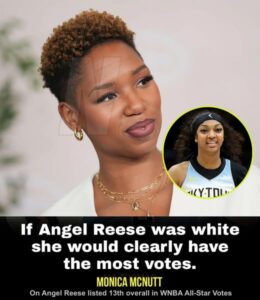The WNBA All-Star voting race has officially turned into a national talking point — and it’s not because of a buzzer-beater or a record-breaking stat line. Instead, it’s a comment from ESPN analyst Monica McNutt that has lit up social media. Speaking candidly about Chicago Sky rookie Angel Reese’s 13th-place ranking in fan voting, McNutt didn’t mince words: “If Angel Reese was white, she would clearly have the most votes.”

The statement has split fans, players, and commentators right down the middle. Some applaud McNutt for calling out what they see as a clear bias in how players are perceived and celebrated. Others argue the remark is divisive and overlooks the complexities of All-Star voting, which blends fan enthusiasm, media coverage, and on-court performance.
Angel Reese’s Impact on the Court
Statistically, Reese has been one of the most talked-about rookies in recent memory. Nicknamed the “Bayou Barbie” during her college days, she’s brought that same flair to the professional stage. Reese has been a double-double machine for Chicago, helping keep the Sky competitive in a season where every win matters.
She’s not just putting up numbers; she’s making headlines. From her rivalry with other WNBA stars to her unapologetic confidence in interviews, Reese has become a central figure in women’s basketball’s growing cultural relevance.
The Discrepancy in Voting
Despite her performances and star power, Reese’s 13th-place spot in All-Star voting has raised eyebrows. In a league with a smaller voting pool than the NBA, a few thousand votes can make a huge difference in rankings.
McNutt’s claim points to an uncomfortable possibility — that racial dynamics may still influence who fans choose to elevate as the “face” of the league. Supporters of her view argue that certain players receive more favorable media framing and fan support because they fit into a traditional marketable image — often young, white, and non-controversial.
The Wider Cultural Conversation
The WNBA has been making strides in popularity, with TV ratings and social media engagement climbing year over year. But with that growth comes scrutiny. Issues of race, marketability, and bias are not new to women’s sports, but they often resurface in moments like these, when a player’s visibility doesn’t match their on-court success.
Angel Reese, for her part, has not publicly commented on McNutt’s remarks, but her own social media presence makes it clear she’s aware of the conversations swirling around her. Known for embracing both her femininity and competitive edge, she’s positioned herself as a player who won’t be defined solely by public perception.
Support and Backlash
Reaction to McNutt’s statement has been fierce. High-profile athletes and commentators have echoed her sentiment, saying that Reese’s energy and production should have placed her much higher in the voting. Critics, however, accuse McNutt of oversimplifying the issue and stirring unnecessary division.
The league has not responded to the controversy, but the timing — just weeks before the All-Star Game — virtually guarantees that the debate will continue dominating headlines.
What’s Next?
Whether or not McNutt’s comment changes any votes, it has undeniably shifted the conversation. The next rounds of voting will reveal if public opinion has swayed, but one thing is certain: Angel Reese’s profile, both as a player and as a cultural figure, is only rising.
For Reese, the All-Star Game might just be one stop in a much bigger journey. For the WNBA, it’s another reminder that the game on the court is only part of the battle — the rest is being fought in the court of public opinion.